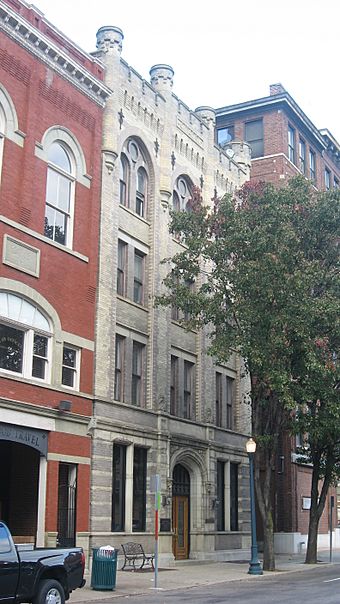Underwriters Salvage Corps (Cincinnati, Ohio) facts for kids
Quick facts for kids |
|
|
Underwriters Salvage Corps
|
|

Front of the Salvage Corps is the red brick building only partial visible; the gray stone building was the YMCA.
|
|
| Location | 110-112 E. 8th St., Cincinnati, Ohio |
|---|---|
| Area | less than one acre |
| Built | 1897 |
| Architect | William Schuberth |
| Architectural style | Queen Anne |
| NRHP reference No. | 82003589 |
| Added to NRHP | July 15, 1982 |
The Underwriters Salvage Corps building is a special old building in Cincinnati, Ohio, United States. It's located right in the city's downtown area. For many years, this building was home to a group that worked closely with the Cincinnati Fire Department and companies that provided fire insurance.
What Was the Salvage Corps?
The Underwriters Salvage Corps was a unique organization. It was created to help firefighters during emergencies. Their main goal was to save lives and property from fires.
How It Started
Local fire insurance companies started the Underwriters Salvage Corps. This happened in 1886 after four years of talks. They wanted a team that could help reduce damage from fires.
As a salvage corps, their job was to assist firefighters. Employees would rush to burning buildings. They tried to save both people and belongings. When they were at a fire, they had the same authority as official firefighters.
The Building's Story
The building you see today was built in 1897. A local builder named William Schuberth oversaw its construction. Its main purpose was to store equipment. It also provided housing for Salvage Corps employees on duty.
The building is made of brick. It has a strong stone foundation. It is built in the Queen Anne style. This means it has a unique, often decorative, design. The building stands three and a half stories tall.
A Special Place in History
In 1982, the Underwriters Salvage Corps building was added to the National Register of Historic Places. This is a list of important historical sites in the United States. It was recognized for its role in local history.
This building was important because the Salvage Corps was unique. It was the only group in Cincinnati that worked closely with both insurance companies and the city's fire department.
 | Emma Amos |
 | Edward Mitchell Bannister |
 | Larry D. Alexander |
 | Ernie Barnes |



